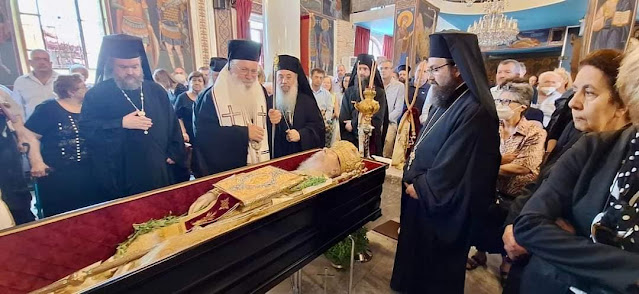By Fr. Elias Makos
On Monday, July 22, the body of the late Metropolitan Ignatius of Berat, originally from Thebes, Greece, was transferred to Berat. The following day, Tuesday, July 23, at 11:30 a.m., after a Divine Liturgy, he will be laid to rest in the Cathedral of St. Demetrius. Metropolitan Nathaniel of Amantia, Archimandrite Anastasios, and Deacon Leonidas accompanied the body of the late Metropolitan from Greece to Albania.
At the Metropolitan Church of the Dormition, the body of the late Metropolitan of the Albanian Orthodox Church was laid in repose, allowing the faithful to pay their respects, accompanied by a Divine Liturgy.
Since his enthronement in 1998, the late Ignatius dedicated himself to a multifaceted liturgical, pastoral, social, and charitable mission, earning respect from all inhabitants of his Diocese, regardless of their religion. Meek, modest, and humble, he tirelessly sought to address the real needs of the people, responding effectively to their spiritual quests and deficiencies. His work continues incessantly and quietly, reaching every human soul for which Christ was sacrificed.
His sole intention was the glory of God and the benefit of the people. He loved Orthodoxy and dedicated himself to it from his youth. Over his two decades of pastoral care in Berat, he proved himself to be a father figure, deeply caring for his spiritual children. He never rested, dedicating himself tirelessly to his faithful ministry, not as an inaccessible despot, but as a conscientious and willing servant of his flock.
For Metropolitan Ignatius, all people—Orthodox or not, virtuous and sinful—were children of the Church. He conversed with them and showed them affection, offering a good testimony every day, understanding that priesthood is both a cross and a resurrection. It is difficult, if not impossible, to fully describe his actions and influence in words.
The people honor him with their trust and recognize his toil, appreciating his mission deeply. He holds a special place in their hearts, offering himself to them and receiving their hearts in return.
Translated by: Konstantinos Menyktas

